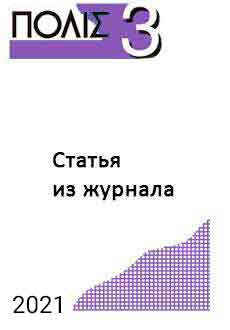Online shop of "Polis. Political Studies" Journal
We in the world, the world in us
Antyukhova E.A. NATO in the Сrosshairs of COVID-19. – Polis. Political Studies. 2021. No. 3. P. 77-90. (In Russ.).
150 руб.
The important influence biogenic threats have had on the context underlying the activities of leading international political actors is one of the most topical issues in current international political research. The COVID-19 pandemic of 2020, which has engulfed the whole world, is one of the most serious challenges the international community is facing. The epidemic has put into question the effectiveness of the strategy of key international actors in these new realities, and has also become an important test for the organizational and functional capabilities of many international institutions. The article seeks to study the main activities and aspects thereof which, against the background of the pandemic, the North Atlantic Treaty Organization (NATO) has performed, as related to a set of measures undertaken by the leadership of the Alliance in the field of organization and information. Special attention is paid to analysing the impact emergencies caused by the pandemic have had on NATO’s strategic priorities in the sphere of political and military planning, as well as on the relations the organization may have had with other key international political actors – in particular, with such an important political player as the Russian Federation. The new challenges that arose in 2020 have become an important test of the effectiveness of different segments of the Alliance, as well as providing a profound challenge for the internal unity of the world’s largest military and political bloc. The problems framed at the beginning of the pandemic in the USA and some European states are, among other things, evidence of miscalculations in the operational planning system of what activities the Alliance can and should do in emergency situations. At the same time, the events related to the pandemic have had some influence on NATO leaders’ understanding of the priorities of its long-term strategy, contributing to the further development of the concept of the “global responsibility” of the Alliance. The analysis of the processes taking place within the NATO framework in recent months is, in our opinion, of fundamental significance both from the viewpoint of understanding the logic of current international political processes in general and from the viewpoint of assessing the dynamics of the development of relations between Russia and the key Western actors who are members of military and political associations.
The important influence biogenic threats have had on the context underlying the activities of leading international political actors is one of the most topical issues in current international political research. The COVID-19 pandemic of 2020, which has engulfed the whole world, is one of the most serious challenges the international community is facing. The epidemic has put into question the effectiveness of the strategy of key international actors in these new realities, and has also become an important test for the organizational and functional capabilities of many international institutions. The article seeks to study the main activities and aspects thereof which, against the background of the pandemic, the North Atlantic Treaty Organization (NATO) has performed, as related to a set of measures undertaken by the leadership of the Alliance in the field of organization and information. Special attention is paid to analysing the impact emergencies caused by the pandemic have had on NATO’s strategic priorities in the sphere of political and military planning, as well as on the relations the organization may have had with other key international political actors – in particular, with such an important political player as the Russian Federation. The new challenges that arose in 2020 have become an important test of the effectiveness of different segments of the Alliance, as well as providing a profound challenge for the internal unity of the world’s largest military and political bloc. The problems framed at the beginning of the pandemic in the USA and some European states are, among other things, evidence of miscalculations in the operational planning system of what activities the Alliance can and should do in emergency situations. At the same time, the events related to the pandemic have had some influence on NATO leaders’ understanding of the priorities of its long-term strategy, contributing to the further development of the concept of the “global responsibility” of the Alliance. The analysis of the processes taking place within the NATO framework in recent months is, in our opinion, of fundamental significance both from the viewpoint of understanding the logic of current international political processes in general and from the viewpoint of assessing the dynamics of the development of relations between Russia and the key Western actors who are members of military and political associations.
 English
English Русский
Русский

Reviews
There are no reviews yet.